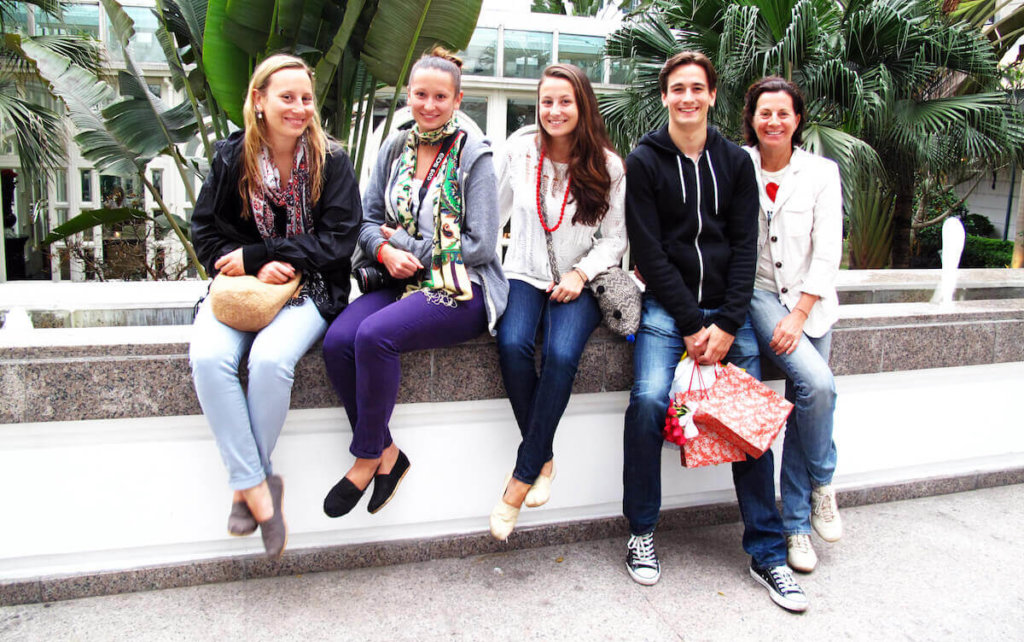Interview with Lana Ojjeh Lette, Co-Founder at Ethos Philanthropies
On Christmas in 2005, entrepreneur Mansour Akram Ojjeh and his wife, Kathy, had an idea. The holiday present to their four children would be different this year; Lana, Lia, Sara, and Sultan, would receive a donation to engage in philanthropy. The original project, which was intended for four years, lasted more than a decade. During that time, the Ojjeh siblings travelled around the globe doing hands-on work to help with projects that address economic development, education, and shelter and care amongst others.
Today, the Ojjeh siblings have circled back together once again to form a start-up that will guide others who want to follow in their philanthropic path. Tharawat Magazine had the opportunity to sit down with Lana Ojjeh Lette, the eldest of the four siblings, and discuss her family’s philanthropic journey and the personal transformation that resulted from it.
How did your philanthropic journey begin?
It was Christmas 2005; we were sitting around the table, the six of us. Our parents said they had this idea for a Christmas gift and it was going be a bit different and we were going to have to be open-minded about it. They told us that they had put aside some money for us to spend on philanthropic endeavours over the course of the following four years. They wanted us to learn how to give to those in need, to work together and to grow more conscious of the world outside the very privileged one we live in. Growing up in Geneva, you realise that you live amongst a small group of very, very fortunate people. So this was a way for my parents to make sure that we stay aware of the world around us. They also wanted to instil in us a good sense of communication. Working together like this would be a way to forge a close-knit group of siblings.
That must have been a daunting challenge for you to face at such a young age. How did you go about taking those first steps?
We had no idea how or where to start. Thankfully our parents had thought of that, and Wise Philanthropy Advisors supported us. They were hired to guide us through the daunting task at hand, but also to help us remain anonymous, as this was one of the requirements our parents had established. We sat with them and had an initial brainstorming session where we established what were our individual and shared interests. What were some of the areas we would like to invest in to get started?
Our father had left us a legacy project involving local government an hour and a half outside of Geneva where some people had fallen through the social safety net, so to speak. It was a really good starting point: Firstly, we realised you don’t have to go across the globe to find people who are in need and who could benefit from a helping hand, and secondly, it let us meet people and actually live our commitment, rather than reading about it in a report some time later. This took us into the first year, and after a while, we were all confident enough that we wanted to take on something a little bit bigger, a little bit more substantial over a longer period.
What was the first project you identified on your own?
The first international project we took on was in Brazil where we supported an organisation called the Children at Risk Foundation. The founder, an unbelievably charismatic man from Norway named Gregory, had set up cultural centres for kids, to give them structure during after-school hours, and to protect them from the violent societies they live in. That was our first field visit to an international project, and it left a mark to say the least. It was a very impressive visit over a couple of days, and from there, our enthusiasm and commitment snowballed.
We each started to run with philanthropic projects that we were bringing to the table. Our mom came with us on most of the trips we took going forward, while our dad was always excited to hear full reports and was very encouraging throughout. He never thought it would take up such a big part of our lives.
On a personal level, when you look at your siblings, what do you feel has been the biggest surprise since you’ve started working with them on these projects?
When we started, I was 21, and my brother was 14, and a 14-year-old boy doesn’t usually take on this kind of thing. We realised a little while into what we were doing that the level of discipline, communication and professionalism that is required in order to keep these projects running, and to be accountable to all the organisations, is huge. Even though we’re siblings and we can text each other and call each other and say, ‘I’m tired or I have this or that going on, let’s do the call later’, we had to learn quickly that we had to find a way to make it work because we had stakeholders. We had people relying on us.
People always ask me, ‘Do you think there’s a right age to engage in philanthropy? Do you think there such a thing as needing to understand the world, especially from a professional context before engaging in this kind of thing’? More and more, my answer is actually that I believe it’s the opposite. I believe today that the philanthropic work we did together, shaped us for the professional world. It brought us together and made us much stronger as individuals because of the level of discipline that was involved at that relatively young age.
Was everyone in agreement that you would extend your efforts beyond the original four-year window?
Over the course of four years, we had become deeply involved in these projects, and some of them needed just an extra little bit of cash or just an extra little push in the timeline. Our parents were really enthused. They could see what great things it was doing for all involved, so they agreed to prolong the commitment for another four years. The extension kept going, and going, and rolled out over 10 ½ years until all of our projects were finally closed. Over those 10 years, you can imagine I went from being 21 to over 30. I had just finished my Bachelors degree when we started, so I travelled, I did a Masters degree, and did another university course. I was working for three years in the meantime. I got married, I had my first baby… For my sisters and my brother, it was the same thing. Lia eventually went onto get her Masters in teaching; Sara got her Masters in grant-making and fundraising and is now running her own consulting business independently. My brother went into finance, but we always knew he would, and it’s a great asset to us too! So for all of us, working together in philanthropy shaped who we became. This has been my sector since I finished my studies, and the same thing for Sara. It changed us completely, and that goes for all of us.
As young people involved in philanthropy, you’ve probably seen this field evolve a lot. Many of the changes were probably fuelled by new technology, so what would you say have been the biggest shifts in the field over the past decade or so?
There’s been a shift in paradigm; it’s a completely different field. Our generation, we’re not happy just writing a cheque and getting a report, or being told about the changes that we’ve helped bring, and then doing that over and over and over again. And that’s evident in the way we shifted the work in the first year of getting involved. What we were doing was supporting grassroots organisations and helping them build up. It was very much a ‘bottom up’ approach and about getting engaged in the field where we could see our impact could be the greatest and most sustainable. So, the change that I did notice might have been coming from our level of maturity changing as we grew as individuals. But also, very much with our level of experience, as we noticed that we want to do things differently. We want to make decisions, we want to be involved, and I think that’s very much the picture of next-gen giving today.
Do you believe philanthropy should always start just outside your doorstep? Or can you be more ambitious and start immediately with a more global focus?
I don’t think that setting your geographic goals needs to be your defining parameter. I think the world is so small today that talking about an international project or global reach doesn’t have the same connotation as it did 20 years ago. If I was starting off today and I said I wanted to tackle maternal mortality, I would say I don’t want to start at home, I want to see what the global picture is. I want to see where there’s the most need. I don’t think that is reaching for the stars. I just don’t think that geography is that much of a barrier anymore. Reaching out globally is an obligation, we have no choice. The world is open to us; it’s at our fingertips. There’s no reason not to reach for it.
After your philanthropic projects, did you feel like you were missing out by not working with your siblings professionally?
Funnily enough, today we’re at a point where our philanthropic engagement is coming full circle. Given all the experience we accumulated, we thought why not put our heads together take things to the next level? Why not build the business out of it and replicate what we were able to experience for our peers? So Sara, Lia and I have set up a company called Ethos Philanthropies that allows us to manage individual donors on a membership basis. We’ll match them with other philanthropists who are interested in the same causes or themes and create giving circles. Learning together, having mutual accountability, and being able to share the experience of hands-on giving, in our experience, is where the life-altering richness of the experience lies.
What are first steps for a family to take when they decide they are going engage in philanthropy?
First of all, I would say define “we” because I think this is one of the biggest problems that a lot of families encounter. Just because you’re my sister or my brother or my cousin, that doesn’t mean I want to be a part of it, or I want to work in that way. So be smart about selecting the “we.” Secondly, I would say reach out for professional help. If my dad said ‘Why don’t you guys start work together and try to identify in what area your work is going to make a difference’, I would’ve been jumping into the deep end. So I would say reach out, get the support, and get a broad idea of how you’re going to structure your work. The hardest part is telling yourself ‘Okay, let’s get involved, let’s go’. Because once you go, you’ll never stop, you’ll never turn back. For a family, it can be life-changing as it has been for us.

